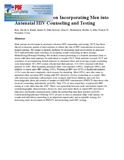Male Perspectives on Incorporating Men into Antenatal HIV Counseling and Testing
Date
2009Author
Katz, David A
Kiarie, James N
John-Stewart, Grace C
Richardson, Barbra A
John, Francis N
Farquhar, Carey
Type
ArticleLanguage
enMetadata
Show full item recordAbstract
Male partner involvement in antenatal voluntary HIV counseling and testing (VCT) has been shown to increase uptake of interventions to reduce the risk of HIV transmission in resource-limited settings. We aimed to identify methods for increasing male involvement in antenatal VCT and determine male correlates of accepting couple counseling in these settings.
Methodology/Principal Findings
We invited women presenting to a Nairobi antenatal clinic to return with their male partners for individual or couples VCT. Male attitudes towards VCT and correlates of accompanying female partners to antenatal clinic and receiving couple counseling were determined. Of 1,993 women who invited their partner, 313 (16%) returned with their partners to ANC. Men attending antenatal clinic were married (>99%), employed (98%), and unlikely to report prior HIV testing (14%). Wanting an HIV test (87%) or health information (11%) were the most commonly cited reasons for attending. Most (95%) men who came to antenatal clinic accepted HIV testing and 39% elected to receive counseling as a couple. Men who received counseling with partners were younger, had fewer children, and were less knowledgeable about prevention of mother-to-child HIV transmission (PMTCT) than those who received counseling individually (p<0.05). Only 27% of men stated they would prefer HIV testing at a site other than the ANC. There was agreement between male and female reports for sociodemographic characteristics; however, men were more likely to report HIV preventive behaviors and health communication within the partnership than their partners (p<0.05).
Conclusions/Significance
Offering VCT services to men at antenatal clinic with options for couple and individual counseling is an important opportunity and acceptable strategy for increasing male involvement in PMTCT and promoting male HIV testing.
URI
http://www.ncbi.nlm.nih.gov/pubmed/19881884http://erepository.uonbi.ac.ke:8080/xmlui/handle/123456789/19666
Citation
PLoS One. 2009; 4(11): e7602.Publisher
Department of Obstetrics/Gynaecology
Description
Full text
Collections
- Faculty of Health Sciences (FHS) [10378]

